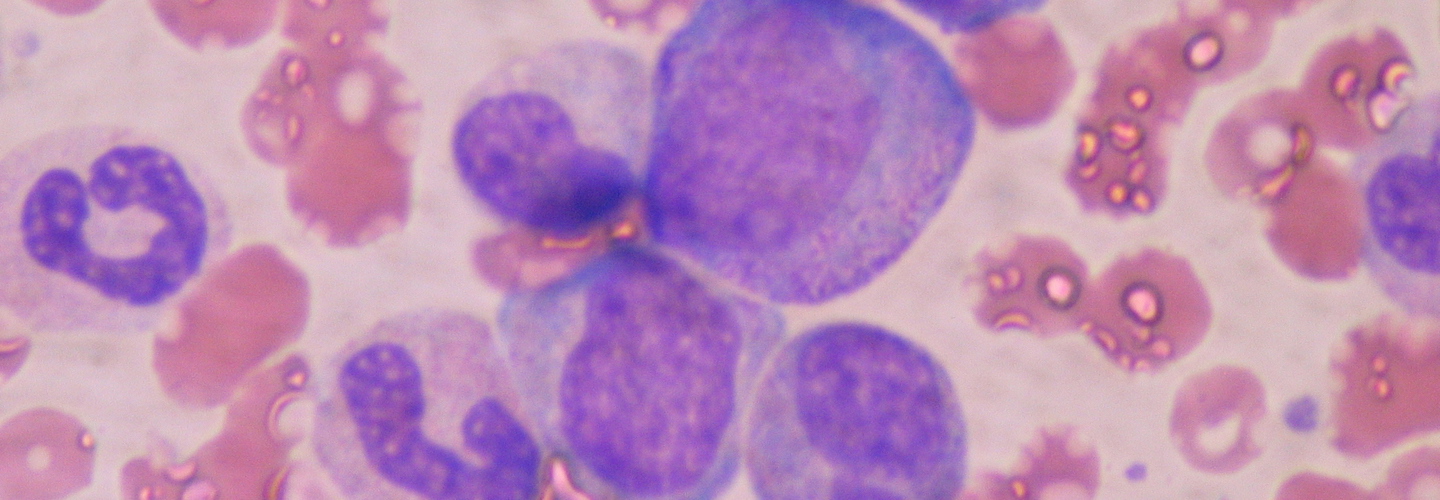May 24, 2018
From gut to blood to cancer—CBC scientists, Lucy Godley and Eugene Chang, UChicago, provide new insights into the mechanism of TET2-linked leukemia development
In a recent paper published in the journal Nature, a UChicago team, lead by Bana Jabri, describes a novel mechanism likely to contribute to the development of blood cancers. Mutation of TET2, which occurs with age in over 15 percent of humans past 60 years old, has been linked to hematopoietic cell proliferation, which may further progress into leukemia. Using an animal model of TET2 mutation, the authors show that progression to leukemia may involve TET2-induced damage to the gut epithelium, allowing intestinal bacteria to translocate to blood and other organs. Subsequent bacterial release of inflammatory signals can have an additional myeloproliferative effect on blood stem cells, eventually tipping the balance towards leukemia development. The mechanism, if confirmed in humans, opens new possibilities for leukemia prevention via anti-inflammatory interventions. CBC Scientific Director for UChicago, Lucy Godley, and past CBC awardee, Eugene Chang, also from UChicago, contributed to the published research. Congratulations!
Under certain conditions, bacterial signals set the stage for leukemia
UChicago Medicine, The Frontline | by Matt Wood | May 16, 2018

Bone marrow. Source: UChicago Medicine, The Frontline.
A new study by researchers from the University of Chicago Medicine shows that bacterial signals are crucial to the development of a precursor condition to leukemia, which can be induced by disrupting the intestinal barrier or by introducing a bacterial infection.
More than 15 percent of people over the age of 60 develop TET2 (tet methylcytosine dioxygenase 2) mutations in hematopoietic stem cells, which give rise to other blood cells. These are known as somatic mutations because they are not inherited, but instead occur by chance with age. These mutations are passed along to the progeny of the mutated cell during cell division and put these patients at risk for blood cancers.
The TET2 mutation gives the hematopoietic stem cells a competitive advantage over others, so they begin to proliferate and make up a greater percentage of cells that become white blood cells. This is a condition known as Clonal Hematopoiesis of Indeterminate Potential, or CHIP. However, the triggers that lead to the progression from CHIP to a precursor condition to leukemia called pre-leukemic myeloproliferation are unknown.
The new study, published May 16, 2018 in Nature, shows that progression from CHIP to pre-leukemic myeloproliferation is dependent on bacterial signals from bacteria normally present in the gut that spread to peripheral organs. The authors studied Tet2-deficient mice, which were shown to develop leukemia with age. However, why only a subset of these mice develop leukemia was not understood.
The study demonstrated that loss of TET2 expression leads to defects in the intestinal barrier, allowing bacteria living in the gut to spread into the blood and peripheral organs. The spread of bacteria leads to the release of inflammatory molecules in the blood, which in turn promote the proliferation of hematopoietic stem cells that lack TET2 expression. This sets the stage for pre-leukemic myeloproliferation.
“Years before a patient develops cancer, there are changes happening in the background. They still appear healthy until they reach a tipping point,” said Bana Jabri, MD, PhD, professor and vice chair for research in the Department of Medicine at UChicago and the senior author of the study. “We have techniques to identify those patients, and now with this paper we know that bacterial signals are key in driving the disease.”
A connection to wandering bacteria
Physicians have already developed genetic screening tools to identify patients with CHIP and monitor them, but it is unknown why some go on to develop pre-leukemic myeloproliferation and others do not. The new study suggests that misplaced gut bacteria play a role.
Normally common strains of bacteria, such as Lactobacillus, reside happily in the gut and cannot pass through the intestinal barrier. The research team, led by UChicago postdoctoral scholars Marlies Meisel, PhD, and Reinhard Hinterleitner, PhD, saw that mice with signs of pre-leukemic myeloproliferation also had gut bacteria that were translocated, or in places they shouldn’t be, like the blood and the spleen. These mice also had elevated levels of an inflammatory protein called interleukin-6 (IL-6) produced by immune cells in response to translocated bacteria.
Breakdown of the intestinal barrier can be caused by a severe gastrointestinal infection. In this case, however, there were no pathogens that caused such an infection. Instead, the researchers believe that the TET2 mutations also cause dysfunction in the intestinal barrier, allowing gut bacteria to translocate.
This combination of factors sets the stage for potential leukemia if the cells accumulate more somatic mutations. However, the researchers showed that there may be ways to intervene. Antibiotics and blockade of IL-6 signals reversed the state of pre-leukemic myeloproliferation in mice that developed symptoms. Also, germ-free mice with TET2 mutations did not develop symptoms, further underscoring the requirement that bacteria need to be present to drive the development of leukemia.
Genetic screening can detect TET2 mutations and early signs of changes in hematopoietic stem cells 10 to 15 years before cancer develops. This means that treatments to block the bacterial signals could reverse pre-leukemic myeloproliferation and limit the risk for developing cancer.
Jabri said the next step is to conduct studies in humans to see if patients with CHIP and pre-leukemic myeloproliferation also have signs of bacterial translocation. Then, clinical trials could test whether treatments that target aberrant IL-6 signals in response to bacteria can reverse its course.
Jabri and hematologist Lucy Godley, MD, PhD, professor of medicine at UChicago and another collaborator on the paper, are continuing to study these links between bacterial signals and pre-leukemic myeloproliferation in humans. Combined with increasingly precise genetic screening technology, this could lead to new means of preventing leukemia.
“There would be a whole new set of ways to follow these patients and see if there are signs of bacterial translocation,” they said. “Once we see anomalies in the blood we can now think of intervening and reversing it.”
The study, “Microbial signals drive pre-leukaemic myeloproliferation in a TET2-deficient host,” was supported by the University of Chicago, the Crohn’s & Colitis Foundation, the Austrian Science Fund, the Christian Doppler Society, and the Canadian government. Additional authors include Li Chen, Zachary M. Earley, Toufic Mayassi, Joseph F. Pierre, Jordan D. Ernest, Romain Bouziat, Daina L. Ringus, Yitang Wang, Ye Li, Vu Dinh, Sangman M. Kim, Benjamin D. McDonald, Matthew A. Zurenski, Mark W. Musch, Eugene B. Chang, A. Murat Eren, and Christopher R Weber from UChicago; Alain Pacis and Luis B. Barreiro from the Universite de Montreal, Canada; Heather J. Galipeau and Elena F. Verdú from McMaster University, Canada; Nikolaus Thuille and Gottfried Baier from Medical University of Innsbruck, Austria; Manuel Buscarlet and Lambert Busque from Hopital Maisonneuve-Rosemont, Montreal, Canada; and Glaucia C. Furtado and Sergio A. Lira from Icahn School of Medicine at Mount Sinai.
Source:
Adapted (with modifications) from the UChicago Medicine, The Frontline, by Matt Wood, published on May 16, 2018.
Citation:
Meisel M, Hinterleitner R, Pacis A, Chen L, Earley ZM, Mayassi T, Pierre JF, Ernest JD, Galipeau HJ, Thuille N, Bouziat R, Buscarlet M, Ringus DL, Wang Y, Li Y, Dinh V, Kim SM, McDonald BD, Zurenski MA, Musch MW, Furtado GC, Lira SA, Baier G, Chang EB, Eren AM, Weber CR, Busque L, Godley LA, Verdú EF, Barreiro LB, Jabri B. Microbial signals drive pre-leukaemic myeloproliferation in a Tet2-deficient host. Nature. 2018 May 16. [Epub ahead of print]
(PubMed)
See also:
Lucy Godley and Eugene Chang, UChicago, have following ties to CBC:
- CBC Scientific Director, UChicago (2016-present):
▸ The CBC welcomes new Scientific Director for The University of Chicago, Lucy Godley - CBC Accelerator Network (CBCAN) (October 26, 2017):
▸ Overview of the CBC’s new Entrepreneurial Fellows (EF) Award program. Moving forward with the Accelerator Award program.
Lucy Godley (UChicago) — Breakout Session Moderator - CBC Accelerator Network (CBCAN) (July 20, 2018):
▸ Overview of CBCAN and the CBC Accelerator Award program
Lucy Godley (UChicago) — CBCAN Speaker and Panel Moderator - 15th Annual CBC Symposium (2017):
▸ Small Molecule Discovery
Lucy Godley (UChicago) — Symposium Organizer - CBC Lever Award (2015):
▸ Chicago Center for Physical Science-Oncology Innovation and Translation
PIs: Vadim Backman (NU), Lucy Godley (UChicago) and Jack Kaplan (UIC) - CBC Exploratory Workshop (2012):
▸ Control of cellular differentiation and gene expression by 5- hydroxymethlcytosine (5-hmc)
Lucy Godley (UChicago) — Workshop Organizer - CBC Catalyst Review Board (2011):
Lucy Godley (UChicago) — Board Member - CBC Catalyst Award (2015):
▸ Role of Gut Microbiota in Determining Drug Efficacy and Toxicity
PIs: Hyunyoung Jeong (UIC) and Eugene Chang (UChicago)


